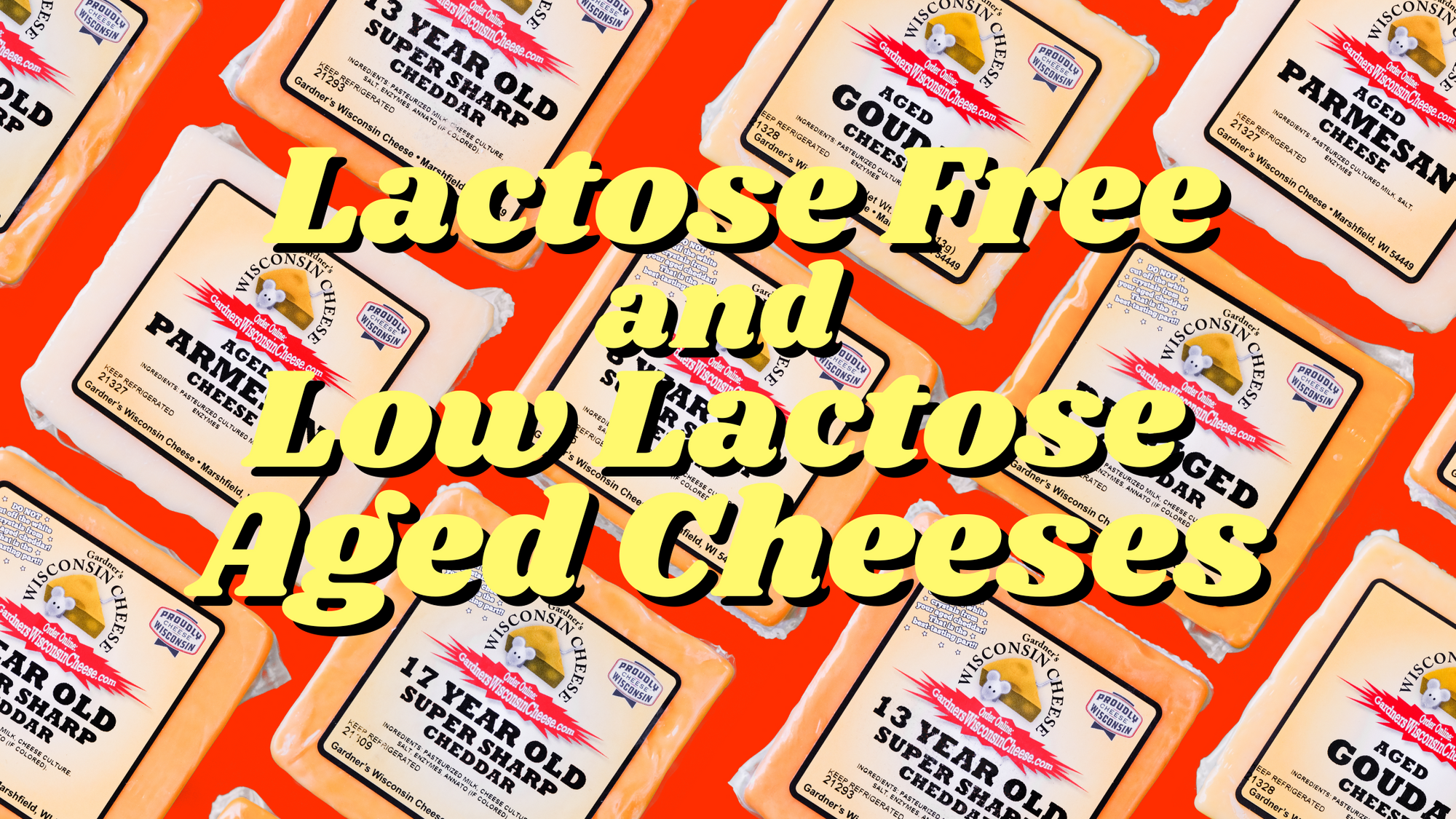
· By Daylon Gardner
A Guide to Lactose-Free and Low-Lactose Aged Cheeses for Dairy Lovers
For many cheese enthusiasts, the words "lactose intolerance" can strike fear into their hearts. The thought of giving up beloved dairy products, especially cheese, can be devastating. However, there's good news for those who find themselves in this predicament. Not all cheeses are created equal when it comes to lactose content. In fact, many aged cheeses are either lactose-free or contain such low levels of lactose that they can be a delicious option for those with lactose sensitivities. In this comprehensive guide, we'll explore the world of lactose-free and low-lactose aged cheeses, providing you with all the information you need to continue savoring your favorite dairy delights.
Understanding Lactose Intolerance and Cheese Consumption
Before we dive into the specifics of lactose-free and low-lactose aged cheeses, it's essential to understand what lactose intolerance is and how it affects cheese consumption.
What is Lactose Intolerance?
Lactose intolerance affects approximately 65% of the global population, with varying degrees of severity. This condition occurs when the body cannot properly digest lactose, a sugar found in milk and dairy products, due to a deficiency in the enzyme lactase.
The Cheese-Making Process and Lactose Content
To understand why aged cheeses have little to no lactose, we need to examine the cheese-making process. Dr. Rachel Johnson, Ph.D., RD, a professor of nutrition at the University of Vermont, explains, "During the cheese-making process, the milk is separated into curds (solids) and whey (liquid). Most of the lactose remains in the whey, which is drained off."
As cheese ages, any remaining lactose continues to break down. This process, known as fermentation, is carried out by bacteria that consume the lactose and convert it into lactic acid. As cheese ages, any remaining lactose continues to break down, resulting in lower lactose levels over time.
Lactose-Free and Low-Lactose Aged Cheeses: A Comprehensive List
Now that we understand the science behind lactose in cheese, let's explore some specific aged cheese varieties that are either lactose-free or very low in lactose. Remember, individual tolerance levels may vary, so it's always best to start with small amounts and monitor your body's response.
Lactose content: Virtually lactose-free (less than 0.1 grams per serving)
Aging time: Minimum of 12 months, often up to 36 months
Flavor profile: Sharp, nutty, and slightly granular
Parmesan is often considered the "king of cheeses" and is an excellent option for those with lactose intolerance. Its long aging process results in a cheese that's not only full of flavor but also contains minimal lactose.
2. Aged Cheddar
Lactose content: Very low (typically less than 0.1 grams per serving for cheeses aged 12+ months)
Aging time: Varies, but low-lactose versions are usually aged 12-24 months or more (Gardner’s Cheddars are aged to 4, 8, 13 and 17 years!)
Flavor profile: Sharp, tangy, and sometimes slightly crumbly
Aged cheddar is a versatile cheese that can be enjoyed on its own or used in cooking. The longer it's aged, the sharper its flavor becomes and the less lactose it contains.
3. Aged Gouda
Lactose content: Very low (less than 0.1 grams per serving for cheeses aged 12+ months)
Aging time: Can range from a few months to over two years
Flavor profile: Rich, complex, with caramel notes in very aged varieties
Gouda becomes increasingly lactose-free as it ages. Look for varieties labeled as "aged" or "extra-aged" for the lowest lactose content.
4. Gruyère
Lactose content: Very low (typically less than 0.1 grams per serving)
Aging time: Minimum of 5 months, with some varieties aged up to 18 months
Flavor profile: Nutty, sweet, and complex
Gruyère is an excellent melting cheese that's low in lactose, making it perfect for those who miss the gooey goodness of melted cheese.
Tips for Selecting and Consuming Cheese for Lactose-Intolerant Individuals
1. Choose aged cheeses: As a general rule, the longer a cheese has been aged, the less lactose it will contain.
2. Read labels carefully: Look for cheeses labeled as "aged," "mature," or with specific aging times mentioned.
3. Start with small portions: Even with low-lactose cheeses, it's wise to begin with small amounts to gauge your tolerance.
4. Consider enzyme supplements: Lactase enzyme supplements can help some individuals digest lactose more easily.
5. Pair cheese with other foods: Consuming cheese as part of a meal, rather than on its own, can help slow digestion and reduce the likelihood of symptoms.
6. Experiment with different varieties: Everyone's tolerance is different, so try various aged cheeses to find what works best for you.
The Science Behind Lactose Intolerance and Cheese Consumption
Research has shown that the aging process significantly impacts the lactose content in cheese. A study published in the Journal of Dairy Science found that lactose levels in cheddar cheese decreased rapidly during the first few months of aging and continued to decline over time.
Dr. Dennis Savaiano, a professor of nutrition science at Purdue University, explains: "As cheddar cheese ages, it loses moisture, which concentrates its nutrients. The bacteria in the cheese continue to break down the lactose into lactic acid, even after the initial fermentation process."
This breakdown of lactose during aging is why aged cheeses are often well-tolerated by individuals with lactose intolerance. In fact, many aged cheddars have lactose levels so low that they are considered lactose-free by dietary standards.
Another study published in the European Journal of Clinical Nutrition in 2019 found that consuming cheese may actually improve lactose digestion in some individuals with lactose intolerance. The researchers hypothesized that this could be due to the presence of beneficial bacteria in cheese that aid in lactose digestion.
Health Benefits of Aged Cheeses
Despite their low lactose content, aged cheeses still offer numerous health benefits:
1. High in protein: Aged cheeses are an excellent source of protein, essential for muscle growth and repair.
2. Rich in calcium: Even without lactose, aged cheeses retain their high calcium content, crucial for bone health.
3. Contains beneficial fatty acids: Aged cheddars contain conjugated linoleic acid (CLA), which has been linked to various health benefits, including reduced inflammation and improved heart health.
4. Provides essential vitamins and minerals: Aged cheddars are good sources of vitamins A, B12, and K2, as well as minerals like zinc and phosphorus.
5. Probiotic potential: Some aged cheeses may contain beneficial bacteria that can support gut health.
Common Misconceptions About Lactose in Cheese
There are several misconceptions about lactose in cheese that are worth addressing:
Myth 1: All cheese contains high levels of lactose.
Reality: As we've seen, many aged cheeses, including cheddars, have very low to virtually no lactose levels.
Myth 2: Lactose-free means dairy-free.
Reality: Aged cheeses with little to no lactose are still dairy products and not suitable for those with milk allergies or following a vegan diet.
Myth 3: You can't enjoy cheese if you're lactose intolerant.
Reality: Many people with lactose intolerance can enjoy aged cheeses like cheddar without experiencing symptoms.
Myth 4: The sharper the cheddar, the less lactose it contains.
Reality: While sharpness often correlates with age and lower lactose content, it's not a guaranteed indicator. Always check the aging time for a better estimate of lactose content.
Conclusion: Enjoying Cheese Despite Lactose Intolerance
Aged cheeses, being either low-lactose or virtually lactose-free, offer a delicious solution for cheese lovers who struggle with lactose intolerance. Through the natural processes of cheese making and aging, aged cheeses provide all the flavor and nutritional benefits of cheese with minimal risk of digestive discomfort.
As we've explored, the science behind lactose reduction in aged chesses is well-established, and numerous options for those seeking low-lactose alternatives. By understanding the factors that influence lactose content and following the tips provided, individuals with lactose sensitivities can confidently incorporate aged cheeses into their diets.
Remember, while aged chesses are generally well tolerated, individual responses may vary. Always listen to your body and consult with a healthcare professional if you have concerns about incorporating aged cheddars or any other dairy products into your diet.
With this knowledge, you can embark on a journey to discover the rich, complex flavors of aged cheeses, knowing that you're making a choice that's not only delicious but also mindful of your dietary needs. So go ahead, indulge in that perfectly aged cheese, and savor every bite with confidence!












